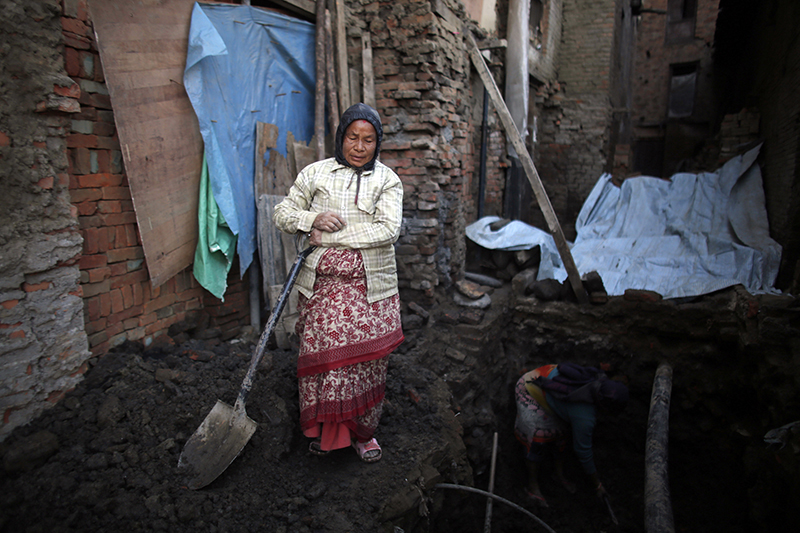Quake-hit families who rebuilt houses on their own to get grant
Kathmandu, April 1
Prime Minister KP Sharma Oli, who chairs the National Reconstruction Authority Consultative Council, told its meeting today that provisions should be made to provide grants to earthquake affected people who have built houses without meeting quake-resistance criteria.
“Whoever has already built their houses themselves should get government grants. If required, law and policy will be changed to provide those grants,” Oli told the NRACC meeting, according to Naya Shakti Party leader Ganga Shrestha, who attended NRACC meeting.
In earthquake-hit areas, there are hundreds of houses that were built by quake-affected people without meeting quake-resistance criteria. They failed to meet the criteria mainly because technicians were not available in rural areas to guide them.
“Some quake victims could not get engineering support in villages when they started reconstructing their destroyed houses in the aftermath of the 2015 earthquakes,” NRA Spokesperson Yamlal Bhusal quoted Oli as telling the meeting. International donors had pressed for building earthquake-resilient houses during the donors’ conference held in 2015 after the earthquake.
Oli said, “Quake victims who do not have land ownership certificates should also get grants but they should build houses and follow the law.” According to Bhusal, the PM told the meeting that quake victims who did not sign agreements for grants should also get grants.
In the past few months, reconstruction of private houses destroyed by the quake has increased rapidly.
According to NRA data, 996,582 households have been surveyed till today, of which 767,705 are eligible for housing grants. A total of 24,991 private houses have been identified as retrofitting beneficiaries, 705,236 beneficiaries have signed agreements for grants, 690,882 have received the first tranche, 291,683 have received the second tranche and 68,167 have received the third tranche. According to NRA, 113,779 houses have already been reconstructed and 388,455 are under construction.
According to NRA, 3,794 beneficiaries of 286 areas should relocate their houses fully or partially, as they fall in the risk zone. As per NRA study, 319 areas should take precautionary measures. NRA also found that 388 areas were safe to build houses, while 319 beneficiaries had relocated to secure places. They will get Rs 20,000 extra grant to purchase land. The PM showed dissatisfaction with the retrofitting work being carried out in the archaeological areas and the Singha Durbar area.
According to Shrestha, the PM said supporting archaeological sites with wooden beams was wrong and those heritages should be built, but it was not necessary to build those sites with the same kind of materials that were used in the past. “We should build the same kind of structure that is strong, but it is not necessary to use the same materials that were used in the past because we might not get those materials now,” the PM told the meeting.
Thirty-two world heritage sites have been rebuilt so far. Similarly, 68 out of 100 monuments not falling under the UNESCO World Heritage site have also been rebuilt. According to NRA, the process of rebuilding 43 per cent (324) of the monuments is yet to start. Reconstruction process of 329 monuments is under way.
Oli has nominated 14 members of Parliament who represent 14 earthquake-hit districts to the NRACC. According to the PM’s Secretariat, newly nominated lawmakers are Agni Sapkota from Sindhupalchowk, Haribol Gajurel from Sindhuli, Hariraj Adhikari from Gorkha, Birodh Khatiwada from Makawanpur, Pampha Bhusal from Lalitpur, Hit Bahadur Tamang from Nuwakot, Bhumi Tripathi from Dhading, Mohan Acharya from Rasuwa, Gagan Kumar Thapa from Kathmandu, Prem Suwal from Bhaktapur, Ganga Bahadur Tamang from Kavrepalanchowk, Shyam Kumar Shrestha from Ramechhap, Yagya Raj Sunuwar from Okhaldhunga and Parvat Gurung from Dolakha.
As per the law, NRACC should hold a meeting at least once in six months. But the meeting could not be held during the tenure of Sher Bahadur Deuba. The prime minister is chairperson of the NRACC and opposition leader is the vice-chairperson. As per law, members of Cabinet nominated by the PM, former prime ministers, chiefs of political parties in the Parliament and 14 members of Parliament from the 14 earthquake-hit districts should be in the council.






